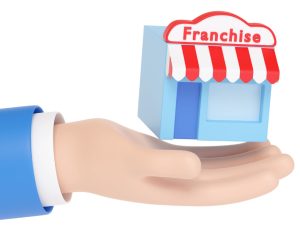While the support and structure provided by a franchise system can give you a head start, the success of your franchise ultimately depends on how well-informed and prepared you are before you sign on the dotted line. Asking the right questions can help you gain clarity, manage risks, and set realistic expectations.
The most essential financial questions
How much money can I make?
This question addresses the core reason most people invest in a franchise: to generate a profit and return on their investment (ROI) – Some are looking to replace their income, while others aim to supplement it. Understanding potential earnings is crucial, as it allows prospective franchisees to assess whether the opportunity is worth the time, effort, and capital required. It also helps them visualize how achieving specific benchmarks will impact their bottom line.
Generally, the higher the initial investment and capital requirements for a franchise system, the greater the expected ROI.
A responsible franchisor plays a key role by helping the franchisee understand critical numbers, benchmarks, and financial scenarios upfront because they know transparency and honesty are the best policies.
How much money do I need?
Knowing the financial commitment and potential rewards upfront allows you to make informed decisions about whether this investment aligns with your financial goals. This includes:
Franchise fee
Pays for your training and the right to use the brand’s trademarks and operating system.
Initial capital investment: Costs associated with securing and preparing a physical location for the business. This can include real estate, leasehold improvements, rent deposits, equipment and fixtures, inventory, signage, marketing and advertising, licensing and permits, professional fees, etc.
Working capital
You need at least a year’s worth of working capital to cover operating expenses during the initial months until the franchise becomes self-sustaining. These expenses include payroll, utilities, rent, inventory replenishment, debt service, maintenance and repairs, insurance premiums, licensing and permit renewals, technology and software subscriptions, taxes, professional fees, and ongoing training for you and your employees.
How long does it take to open?
Understanding the timeline from signing the franchise agreement to opening the doors of your franchise is crucial as it affects several aspects of your planning:
Setting realistic expectations
It helps you mentally and logistically prepare for the process, avoiding any surprises that could cause stress or disappointment.
Financial planning and cash flow management
The timeline impacts when you’ll need to make payments such as rent, payroll, and inventory purchases, and when you can expect to start generating revenue. This is vital for managing your cash flow and ensuring you have enough working capital to cover the initial months of operation.
Coordination and preparation
The timeline also affects when you’ll need to coordinate with contractors for build-out, suppliers for equipment and inventory, and other service providers.
Personal and family planning
Understanding the opening timeline helps you plan around significant life events, vacations, or other commitments.
Remember, it’s a red flag when the franchisor has sold a lot more units than are currently open. This could be a sign of the franchisor over-selling and over-promising. The franchisor may be aggressively selling franchises without ensuring they have the resources and infrastructure to support new franchisees. This can lead to a situation where franchisees are left without the necessary support to open and operate successfully. It’s good to know upfront what kind of support is available from within the system.
How long does it take to break even?
Breaking even is a significant milestone in any business, indicating that you’ve covered your initial costs and are on the path to profitability. Understanding the break-even timeline is crucial for:
Financial Planning
Knowing how long it typically takes for franchisees in the system to break even helps you manage your cash flow and ensures you have enough financial reserves to sustain the business during this period.
Assessing Risk
A longer break-even period may indicate higher operating costs or lower initial revenue. You don’t want to go into a business undercapitalized – you want to make sure that you have access to enough cash till the business stands on its feet.
Benchmarking
You can compare your expectations with industry standards and other franchisees within the system to determine if the opportunity is right for you.
This insight is key to setting realistic financial expectations and making informed decisions about your investment.
How long would it take to hit substantial income?
Knowing how long it typically takes to reach substantial income helps with:
Setting financial goals
You can establish a realistic timeline for achieving significant financial returns.
Assessing the business model
A shorter timeframe suggests a strong and scalable model, while a longer timeframe may indicate potential challenges in generating revenue. Knowing those challenges, and how other franchisees in the system overcame them can be tremendously helpful.
Long-term financial stability
Reaching substantial income indicates that the business has moved beyond just breaking even and is now generating significant profits.
Scalability
If franchisees typically reach substantial income within a reasonable timeframe, it suggests that the business has good scalability, which is beneficial if you consider expanding to multiple units.
Understanding this timeline helps you gauge the long-term potential of the franchise and plan your financial strategy accordingly.
How valuable is your time to go through the entire process and learn the system?
This is the most important question because it directly impacts your success and satisfaction as a franchisee. It touches on every aspect of your journey:
Commitment to learning
Franchising demands a significant time investment to fully understand the system, master the operations, and effectively apply the franchisor’s guidelines.
Opportunity cost
Time is one of your most valuable resources. You must evaluate whether the time required to succeed in the franchise is worth the opportunity cost of not spending that time elsewhere.
Long-term commitment
Running a successful franchise is not a short-term endeavor. It requires ongoing dedication long after the initial training is complete.
Maximizing return on investment
Your time is one of your greatest assets, and its true value is realized through how efficiently and effectively you manage your franchise. Whether it’s a brick-and-mortar business or a service-based franchise, your most profitable investment as a new or prospective franchisee lies in choosing a modern franchise system that has a fully integrated sales, marketing, and fulfillment machine. This system uses cutting-edge technology to seamlessly turn strangers into raving fans of the business. Remember, the more streamlined and productive your operations, the greater your potential return on investment.
Ultimately, you want to control your business, not let it control you. A strong franchise system will have the necessary elements in place to allow you to guide and direct your growth trajectory—whatever that may mean to you.
Final word
The beauty of franchising lies in the collective strength and support that comes with being part of something bigger.
As you weigh your options and make your decision, remember the wisdom of the African proverb: “If you want to go fast, go alone. If you want to go far, go together.” In franchising, your journey is one of partnership and shared success.
By aligning yourself with a responsible franchisor and a network of fellow like-minded franchisees whose values are congruent with yours, you’re choosing to go far, together.
To your success!








